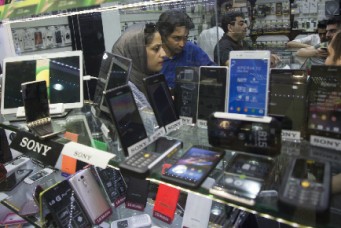Egypt’s Two-faced Policy On Human Rights
Egypt’s attempted reconciliation with the international community and securing of foreign support, investment, and aid are not possible as long as Egypt holds at least 12 journalists behind bars.
The government of President Abdel Fattah El-Sisi hopes to implement a double-faced policy: try to appease the international community and outside supporters, arguing that the country is on track for democracy and justifying restrictive measures under an anti-terrorism banner, while at the same time showing zero tolerance for dissent or criticism.
The approach is doomed to fail. President El-Sisi can continue to talk big at the United Nations’ General Assembly about his “new Egypt” that will “guarantee freedom of speech,” and can make small gestures by releasing a political prisoner here and there. But the only way for Egypt to do right with the world is to release all journalists from behind bars and reform the oppressive laws that put them there.
El-Sisi’s real challenge, in the near future, will be addressing the country’s failing economy. He has depended on the generous cash flow from Egypt’s Gulf allies who pledged $12 billion dollars in aid. But those countries are notorious for failing to deliver on their pledges (including those made for rebuilding Gaza and for aiding Syrian refugees). Also, their money, if it comes, won’t be sustainable and won’t inspire the confidence of global financial institutions and investors.
The contradiction in policy is obvious and sometimes causes embarrassment. El-Sisi presents himself as Egypt’s new strong man. He assumed executive and legislative powers and used his initial appeal to pass unpopular reforms, like cutting food and gas subsidies. But when it comes to releasing journalists from prison, El-Sisi claims suddenly that his hands are tied. For instance, when the U.S. media pressed the Egyptian president over concerns about the absence of due process for detainees and the sentencing of journalists, El-Sisi said that he cannot interfere because he wanted to respect the independence of the Egyptian judiciary.
Egypt’s attempted reconciliation with the international community and securing of foreign support, investment, and aid are not possible as long as Egypt holds at least 12 journalists behind bars. What is happening inside Egypt cannot be concealed from outside observers. Silencing local non-governmental organizations and the media won’t stop independent voices and international groups from exposing Egypt’s human rights crisis.
We at the Committee to Protect Journalists have documented an unprecedented number of anti-press abuses since the El-Sisi-backed government ousted former President Mohammed Morsi in July 2013. Al-Jazeera’s journalists imprisoned in the country have been a major talking point raised with El-Sisi and every other Egyptian official to step foot outside the country to attend global events or meet with counterparts.
Most importantly, as Egypt prepares for parliamentary elections and to host an international economic conference in March, international scrutiny of its affairs is going to shape its chances for international aid and investment. Muzzling the news media and threatening critical voices diminish any chance of credible election results since open debate is a requisite for any free and fair election.
Without credible elections, U.S. Secretary of State John Kerry might use a waiver to temporarily allow the flow of aid to Egypt this year because of pressing security concerns, such as containing the militant group the Islamic State in Iraq and Syria, and to accommodate Egypt’s allies. But he cannot credibly certify to Congress that Egypt is moving toward democracy and thus is worthy of receiving aid in the future.
Furthermore, international investors need rule of law and guarantees against government interference or abuse. The government’s use of politicized charges to hold thousands in pretrial detention for extended periods and sentence hundreds to death without due process does not bode well for investors to operate freely.
Take for example, the bizarre November decision of the Cairo Regional Center for International Commercial Arbitration (a trade and commerce court) to fine comedian Bassem Youssef and his company, Q-Soft, 50 million Egyptian pounds ($13 million) because his show was not “purposeful and constructive” and was “smearing the country’s political direction.” In doing so, the court went well and beyond its rule as a commercial arbitrator to become a political critic to the contents of Youssef’s show on behalf of the government. The Egyptian government’s cultivation of public mistrust and xenophobia based on “subversive foreign threats” to justify its crackdown on critics doesn’t encourage any international investors to take their chances in Egypt, either. Police raids and the shutdown of TV channels and local NGOs and the forcing out of international NGOs are nothing but red flags.
Al-Jazeera’s journalists were arrested, put through a year-long sham trial, indicted without evidence, and now will be retried, all for what one of the three, Mohamed Fadel Fahmy, called a “geopolitical game” between Egypt and Qatar that had to do nothing with their work as journalists. In reality, the three are closer to being “hostages,” Fahmy wrote.
These are the challenges that stand between the Egyptian government and its effort to engage with the world. El-Sisi won’t need to convince the world of his “new Egypt,” but rather do the necessary work to break from the old one. Showing tolerance of dissent and allowing media and civil society to operate freely, would be the first step. Otherwise, he is wasting valuable time and opportunities for the reforms that Egypt needs most.
Sherif Mansour is the Middle East and North Africa Program coordinator at the Committee to Protect Journalists.


